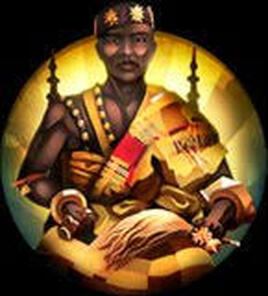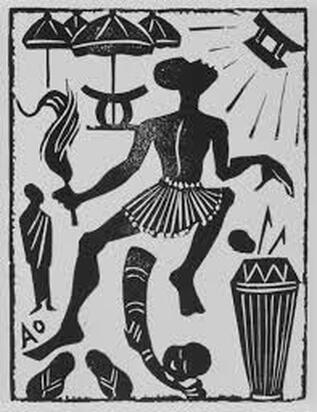|
Before the founding of the Asante Empire, the Asante was a part of an Akan ethnic group that eventually became divided over time. What caused the division is debated, but whatever the truth is, it helped to lead to the unification of the Asante Empire. Migrations of the early Asante people led them settling along the coast of modern-day Ghana, the location they chose was rich in gold, kola nuts, and other natural resources; it was also a prosperous trade route. The Asante had not yet become a powerhouse, the Denkyira were the dominant Asante state; the Asante king at the time Obiri Yeboa had plans to become the dominant Asante state and eventually unify the Asante states. Obiri Yeoba was the Asante King from sixteen-sixty until sixteen-eighty. Little did Obiri Yeboa know his nephew Osei Tutu would bring his dream to life. Osei Tutu became the King of the Asante in sixteen-eighty, succeeding his uncle Obiri Yeboa, Tutu along with his priest Okomfo Anokye prepared to carry out their plans to unify the Asante. As stated previously, the Denkyira was the dominate Asante group and the main adversary for Tutu to conquer. Before Tutu made his move against the Denkyira, he united the other Asante clans he was named the Asantehene or King of the Asante, and united the remaining Asante clans under the Asantehene. Tutu also became the first Asantehene to have the Golden Stool. It is said that during a meeting between Tutu and the other Asante chiefs, Tutu's priest Okomfo Anokye summoned a golden stool from the heaven that landed in Osei Tutu’s lap. The Asante chiefs pledged their allegiance to the Asante, the golden stool, and Osei Tutu. The next step for Tutu was to defeat the Denkyira and unite the Asante kingdom. Okomfo Anokye along with his magic helped to decide the location of the Asante capital. Okomfo Anokye planted two trees, one at Kumasi and one at Kumawu, Kumasi became the Asante capital because the tree planted there grew tall and strong, the tree at Kumawu died. The cities of Jenne and Timbuktu were very important to the trade routes flowing through the Asante occupied area of Ghana. Whoever controlled the Asante clans controlled the trade routes. When Kumasi became the capital of the Asante states Tutu gained the title of Kumasihene along with his title as Asantehene during the first Odwira Festival, which is an annual festival to celebrate the unification of the Asante states. Tutu along with Okomfo Anokye and other Asante leaders created a constitution and a confederacy to govern the unified Asante states, it was also expressed that Tutu held the power of Chief of the Asante and the Chief Priest. Osei Tutu had one very critical mission; to achieve his goal defeating the Denkyira was a must. Tutu organized a strong military force to protect his unified Asante state, he also used his military to expand into the Asante Empire. Tutu eventually went to war against the Denkyira and defeated them, he also defeated other opposing states, the defeated Asante states along with the Denkyira became a part of the now unified Asante Empire. The empire was officially unified under Osei Tutu in the year 1701; under his leadership, the Asante Kingdom flourished, expanding economically, geographically, politically, and militarily. The Asante Empire became one of the most legendary empires in the history of the world. Tutu led the Asante Empire until his death in 1717 during a battle against the Akyem. The Asante Empire continued to flourish even after Tutu’s death, Opoku Ware succeeded Tutu and strengthened the unity if the Asante Empire by creating the Great Oath of the Asante. The empire continued its reign until it fell to the British invaders in the year 1900. To the great Asantehene Osei Kofi Tutu I, we proudly stand on your shoulders. J.A. Ward Click here to learn more about the On the Shoulders of Giants book series!!! References:
https://en.wikipedia.org/wiki/Osei_Kofi_Tutu_I https://www.blackpast.org/global-african-history/tutu-osei-kofi-c-1680-1717/ http://en.lisapoyakama.org/osei-tutu-the-founder-of-the-asante-empire/ https://www.ghanaweb.com/GhanaHomePage/history/ashanti.php https://www.culturesofwestafrica.com/history-ashanti-empire-colonization/ https://en.wikipedia.org/wiki/List_of_rulers_of_Asante https://ghananation.com/rulers/?blurb=403
0 Comments
Leave a Reply. |
Details
Categories
All
Click Here to join our mailing list
|
Contact Us: |
Connect With Us |
Site powered by PIT Web Design



 RSS Feed
RSS Feed



